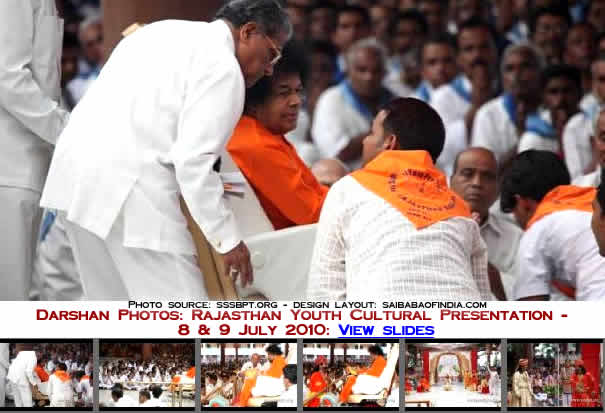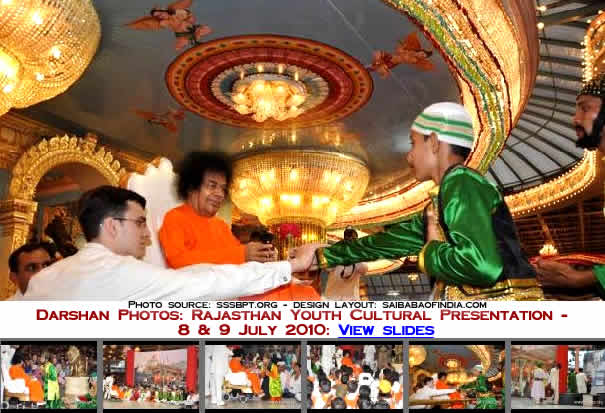|
The State of Rajasthan, with a group of over 160
youth who came on a three day pilgrimage, staged two cultural
programmes on 8th and 9th of July in His Divine presence. The state
that is a repository of cultural abundance picked the lives of two
of her illustrious sons, Rana Pratap Singh of Mewar, the King who
was known for his love and loyalty for motherland, and Khwaja Moin-ud-din
Chishty of Ajmer, the most famous Sufi saint of the Chishti Order of
South Asia, who also popularly known as Khwaja Garib-un-Nawaz.
Maharana Pratap has always been held in great esteem in India whose
name was projected as a model for patriotism and freedom struggle.
Despite various hardships he stood firmly for the honour and dignity
of his motherland. In a life full of ideals and principles, the king
lived the famous saying, “Janani Janma Bhoomischa Swargadapi
Gareeyasi”, meaning the honour of one’s motherland is much higher
than that of the heaven.
The great battle ensued between the Mughal Emperor Akbar and Rana
Pratap, after several rounds of persuasive attempts to accept
Akbar’s ambitions, was depicted narrating the background story that
led to the battle. Though the throne of Mewar was assigned to the
younger brother Jagmal Singh, under the influence of Maharana Udai
Singh’s favourite queen, loyal Rajpuths who had foreseen the folly
and danger forced Jagmal to abdicate the throne in favour of the
Rana and Jagmal, in turn, joined the Moghal forces threatening to
take revenge on Rana Pratap.
The famous Battle of Haldighati, in 1576, was fought between the
mighty Pratap Singh, having the backup of 20,000 strong army,
against a much stronger Akbar, with an army of 80,000. Fierce, still
indecisive battle ensued to the embarrassment of the mighty Mughal
emperor. The Maharana was not defeated, but was surrounded by the
enemies. Shakthi Singh, estranged brother of the Rana, did a timely
loyal act to save the King. The Rana was grief-stricken at the loss
of his loyal horse, Chetak.
Relentless attack from the Mughals left the Rana’s army weak who was
finding it difficult, financially, to maintain the strong force. An
unexpected financial offer came from one of his ministers, Bhama
Singh, who offered all his wealth to help support 25,000 strong army
for 12 long years. Pumped up by a renewed vigour and enthusiasm, the
Maharana regrouped his forces to win back 32 forts, eventually
freeing most of Mewar, including Udaipur and Kumbhalgarh. He could
not win back Chittorgarh, but never gave up the spirit of fighting.
Resolute in his approach, passionate to win his motherland from
the clutches of the Mughals, the Rana, in a specially convened
meeting, urged his trusted chieftains of his decision to leave all
his royal comforts, till he could win back his kingdom.
“My brave warrior brothers, our Motherland-holy land of Mewar, is
still under the clutches of the Mughals. Today, I take an oath in
front of you all that till Chittorgarh is freed, I will not have
food in gold and silver plates, will not sleep on a soft bed and
will not stay in the palace; instead I will eat food on a
leaf-platter, sleep on the floor and stay in a hut. I will also not
shave till Chittorgarh is freed. My brave warriors, I am sure that
you will support me in every way sacrificing your mind, body and
wealth till this oath is fulfilled”.
Needless to say that his loyal chieftains were very much inspired
who declared all-out support to bring freedom for their Motherland.
Fighting with great patriotic fervour, showcasing the art of
bravery, self-confidence and sacrifice, the Maharana fought
relentless till his last breath. His journey was a life of Self
Confidence, Self Satisfaction and Self Sacrifice that finally led
him to Self Realisation on January 29, 1597, the day when he finally
attained His Lotus Feet, that of his chosen God, His Beloved Ekling
Ji (Lord Shiva).
The presentation had a narrator who introduced the drama, followed
by various events as interludes taking the theme along. At the end
of the programme, Bhagawan moved down the stage to pose for a group
photo session with the participants.
KHWAJA GARIB NAWAZ
Khawaja Moin-ud-din Chishti was born in 1141, popularly known as
Garib Nawaz, is the most famous Sufi saint of the Chishti Order of
South Asia. He was one of the most outstanding figures in the annals
of Islamic mysticism and founder of the Chistiyya order in India.
The programme on the 9th July evening was a portrayal of his journey
from Moin-ud-din-Hasan, a ‘specially gifted child’ of a pious,
righteous couple to Khwaja Moin-ud-din Chishti, an exponent of true
spirit of Islam.
As a child he was compassionate, God-Loving and by the mysterious
intervention of the Almighty, through a mystic by name Ibrahim
Qanduzi, he was enlightened at a very young age. One day when the
young lad was working in the garden, who had by then lost his
parents at the age of fifteen, Ibrahim Qanduzi happened to pass by.
Pleased with young Hasan’s hospitality, the mystic presented him a
portion of an oil cake, after chewing the first portion himself, to
eat. And Lo! That instant became his moment of realization!
Hasan, in pursuit of knowledge travelled wide, ending up meeting
with Khwaja Usman Harooni, a sufi saint of the Chishti Order.
Impressed by the spiritual eminence, the master trained Hasan for
twenty long years. Hasan accompanied Khwaja Usman on arduous mystic
journeys while performing all the rigorous ascetic practices
prescribed by his Master.
The Khwaja was happy at the progress of his disciple. He advised
him: “I have entrusted thee to God. Be dependent on God always and
do not withhold any hope from people. Be aloof and do not demand
anything from anybody. Do not discriminate between people on the
parochial grounds of their religious faith. O Moin-ud-din! I now
entrust you to the care of God”. Having said this, the Master
honoured his disciple with his robe and took him to Haj. After
visiting the holy shrines in Makka and Madina, one night, in trance,
he heard the Voice of God. “O Moin-ud-din! I entrust to thee the
country of Hindustan (India). Proceed to Ajmer and show the path of
truth to the people there”.
Taking leave of his Master, Khwaja reached Ajmer, much to the
resentment of the ruling king Prithviraj Chauhan. Khwaja was simple
in his life, completely detached from all worldly attractions. His
simplistic life style, piety and devotion to God attracted many to
his Bargah, where rich and poor would often stand side by side
praying to Almighty. The Khwaja who preached the same message as
that of Bhagawan, to Worship God in Men, passed away at the ripe age
of 97. Even today, his shrine, popularly known as “Dargah Sahrif”
has been attracting millions of people from all walks of life and
faith, all over the world, irrespective of caste, creed and belief
and thus spreading the eternal message of Brotherhood of Man and
Fatherhood of God.
At the end of the programme clothes were distributed to the
participants, after which, Bhagawan moved down the stage to pose for
a photo session, blessing all.
|

